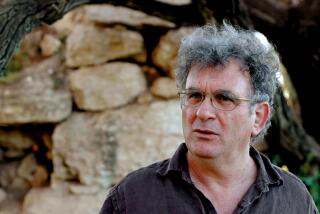LAYING CLAIM TO JERUSALEM
- Share via
In your letters column (Book Review, Oct. 15), there is a commentary, from an Arab perspective, on Roger Friedland and Richard Hecht’s review of Amos Elon’s new book, “Jerusalem: City of Mirrors.” What follows are some comments about the Friedland-Hecht review from a Jewish perspective.
“Only in 1949,” the reviewers write, “ after voices were raised in the United Nations to internationalize the city, did Israel move its capital to Jerusalem.” It appears that Friedland and Hecht are not familiar with the simplest facts regarding the period in question. Within hours of the proclamation of the sovereign independence of the state of Israel--on May 14, 1948--five Arab powers launched a military assault designed to destroy the Jewish state. That war raged on and off until the spring of 1949, when a truce was arranged. It was only during this conflict that Israel gained control of the New City of Jerusalem. Obviously, it would have been impossible for the Israelis to move their capital to Jerusalem before they controlled any part of the city. They did so as soon as it became physically possible.
The reviewers criticize Elon for “not treating Jerusalem (as) the Palestinians’ national capital.” The truth is that there is no Palestinian state and therefore no Palestinian national capital. It seems that Friedland and Hecht have swallowed Yasser Arafat’s line 100%.
“Jerusalem is still the symbolic and political center of the Palestinian nation,” the reviewers declare. “By building the new Jerusalem as a ‘united’ island of Israeli sovereignty, the Israelis helped make it so.” If there is such a thing as a “Palestinian nation,” though, it exists in Jordan (70% of whose population is “Palestinian”), not in Israel. Moreover, to speak of Jerusalem as still the center of the “Palestinian nation” implies that this was so in the past, which is historically false.
During the Middle Ages, when Arab civilization reached its zenith, the great cities with which the Arabs identified were Mecca in Arabia, Baghdad in what is now Iraq, Cairo in Egypt and Cordova in Spain. There was no such identification with Jerusalem. During the more than 400 years, prior to 1917, that the Ottoman Turks controlled Jerusalem (it became a backwater town, not even a provincial capital, of the Turkish Empire), no serious effort was ever made by the Arabs to liberate it from Turkish rule. The truth is that there was no such thing as an Arab memory of a past glorious relationship with Jerusalem.
SOL MODELL, WOODLAND HILLS
More to Read
Sign up for our Book Club newsletter
Get the latest news, events and more from the Los Angeles Times Book Club, and help us get L.A. reading and talking.
You may occasionally receive promotional content from the Los Angeles Times.








